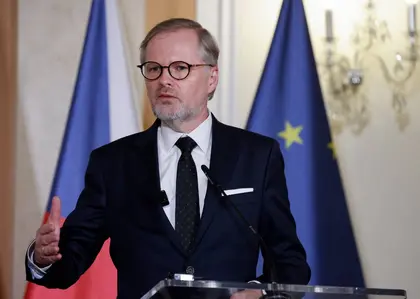The European Commission rejected Hungary and Slovakia‘s request for urgent consultations regarding Ukraine’s introduction of sanctions against the transit of crude oil from Russian supplier Lukoil because it doesn’t affect pipeline use by other trading companies, Bloomberg reports.
The European Commission rejected the requests of Hungary and Slovakia regarding oil transit
JOIN US ON TELEGRAM
Follow our coverage of the war on the @Kyivpost_official.
A spokesperson for the European Commission said that the EU’s analysis does not show an immediate risk to supplies for the two countries and that the European Commission is now waiting for more detailed information from Hungary and Slovakia.
European Commission Vice President Valdis Dombrovskis told Hungary and Slovakia that “preliminary analysis shows sanctions Ukraine imposed on Lukoil don’t affect transit operations carried out by trading companies via the Druzhba pipeline as long as Lukoil isn’t the formal owner of the oil,” according to Bloomberg.
Earlier, in a phone call Thursday, Dombrovskis and Ukrainian Prime Minister Denys Shmyhal discussed the issue of energy sanctions against the Russian Federation and Ukraine receiving $50 billion from the use of frozen Russian assets.
Shmyhal said that “sanctions introduced by Ukraine do not violate the Association Agreement with the EU, and the reaction of the Slovak and Hungarian parties is extremely politicized and manipulative.”

Czechs Complete Pipeline to Replace Russian Oil Supply
According to Shmyhal, “Ukraine is always open to constructive cooperation with EU member states, particular with Hungary and Slovakia.”
Ukraine won‘t cancel sanctions against Lukoil, since they don‘t threaten Slovakia
The day before, Shmyhal called on Slovakia’s Prime Minister, Robert Fico, to abandon using Russian oil. Shmyhal said that “Russia and energy security are incompatible things.”
Shmyhal continued: “Ukraine has insisted and continues to insist on the need to give up Russian oil as much as possible. Russia and energy security are incompatible.”
Shmyhal recalled that the EU has allowed Slovakia and several other countries to use Russian oil on the condition that they would actively develop alternative supply channels.
Hungary says it will block €6.5 billion EPF payment until Ukraine allows the transit of Lukoil
On July 23, the Ministry of Energy of Hungary convened a working group on the security of supply regarding the stability of the supply of energy resources, which reviewed the steps already taken and possible future actions.
“As long as this issue is not resolved by Ukraine, everyone should forget about the payment of the €6.5 billion ($7 billion) of the European Peace Facility (EPF) compensation for arms transfers,” said Péter Szijártó, Hungary’s Foreign Affairs Minister.
Slovakia’s Prime Minister threatens to halt deliveries of diesel, which amounts to a tenth of Ukraine’s diesel fuel consumption
On July 21, Fico criticized Ukraine for imposing sanctions against Lukoil, threatening to cut off its supply of Slovakian diesel to Kyiv.
“Slovakia does not intend to be a hostage of Ukrainian-Russian relations, and the decision of the Ukrainian president means that the Slovak oil refinery Slovnaft, which is part of the Hungarian MOL group, will receive 40 percent less oil than it needs for processing,” Fico said.
“This will affect not only the Slovakian market but may also lead to the cessation of oil supplies to Ukraine produced by Slovnaft, which accounts for almost a tenth of all Ukrainian consumption,” claims Fico.
Slovakia and Hungary said they had stopped receiving oil from Lukoil after Ukraine’s transit ban in June.
You can also highlight the text and press Ctrl + Enter






